Seventy-five percent of customer experience leaders believe that artificial intelligence can improve human intellect rather than replace it. Not to mention that integrating AI into your knowledge management systems could provide you access to AI-powered support and immediate replies.
Companies aim to fulfill and surpass the changing demands of their clientele. You could be able to produce content, uncover pertinent, accurate information, and enhance your agents’ skill sets with the correct AI knowledge base.
To avoid AI detection, use Undetectable AI. It can do it in a single click.
What is AI Knowledge Base?
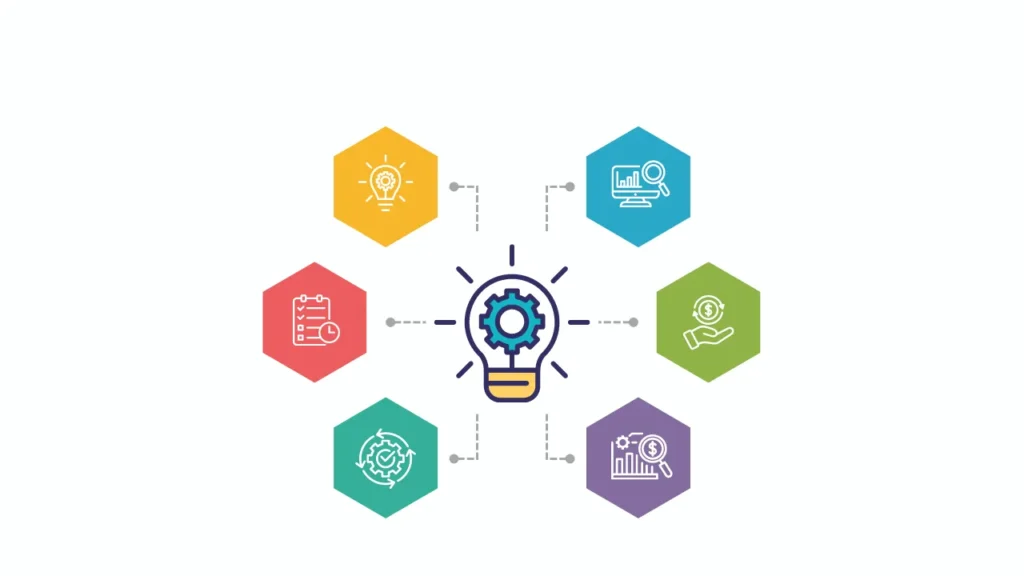
Organization, storing, and management of data and information are done by an AI knowledge base, which is a centralized hub that uses AI and machine learning to comprehend, process, and present accurate and pertinent information to users on demand.
AI knowledge bases can improve user experiences, expedite customer support, and improve decisions.
NLP and ML in AI Knowledge Base
Computers can comprehend, interpret, and produce human language due to a field of artificial intelligence termed natural language processing, or NLP. NLP algorithms examine and interpret spoken or written information to determine its meaning and context.
Algorithms for machine learning create predictions or judgments without explicit programming by learning from data inputs and enhancing performance. Based on user interactions, they analyze data to find patterns, improve search results, and provide personalized solutions.
How NLP and ML Work Together?
In order to continuously enhance the effectiveness of the knowledge base, machine learning algorithms examine and learn from the data input (user queries, interactions, and feedback). Over time, they improve user query understanding, hone search results, and suggest precise and contextually relevant content.
An AI knowledge base learns from user interactions, improves its comprehension of linguistic nuances, and then implements adjustments to deliver accurate and useful responses.
Benefits of Using AI Knowledge Base
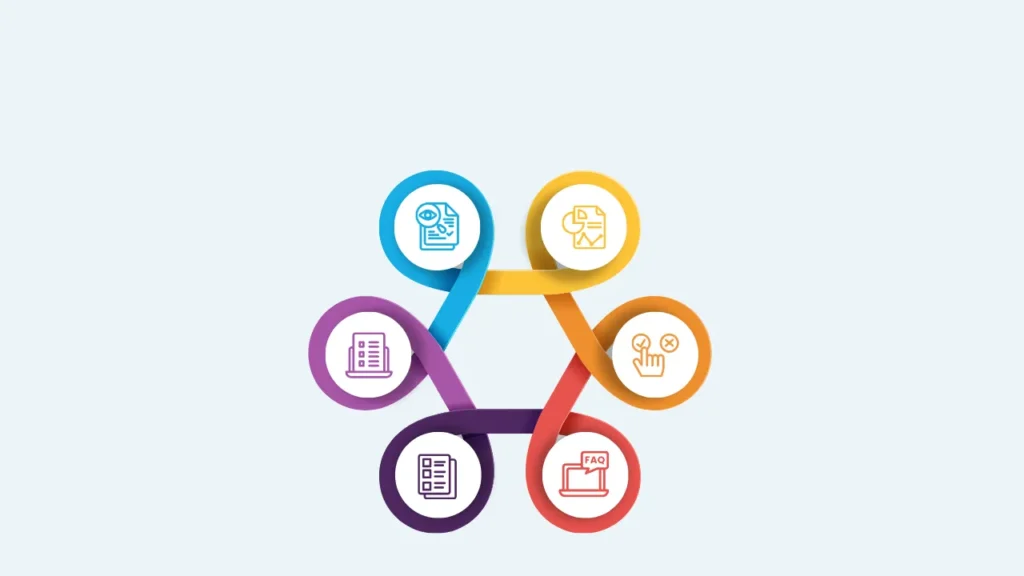
An AI knowledge base capability is beyond just an automated setup. It provides a multitude of advantages that assist clients, representatives, and corporate operations.
Permits Self-Service For Customers
AI knowledge bases empower clients to find solutions independently. AI-powered suggestions and user-friendly search features facilitate customer self-service. Quick access to pertinent data, FAQs, troubleshooting manuals, and tutorials is provided to users.
Self-service improves the customer experience by offering round-the-clock, instant assistance.
Simplifies the Production of Content
By finding content gaps, spotting out-of-date materials, and proposing new topics based on user feedback and ticket requests, AI algorithms can help with content management. AI is able to identify, for instance, a surge in certain client requests, such as using live chat to request assistance with password resets.
AI can highlight content management teams and advocate generating knowledge base pages on this topic.
Speeds Up Agent Training and Onboarding
By providing thorough, current resources, AI knowledge base systems can facilitate the onboarding and training of new agents. Agents can resolve issues quickly when they can easily locate and access training materials, documentation, and critical client data from a single center.
AI systems can also recommend articles within tickets, assist with content creation, and provide agents with relevant resources.
Lowers Operating Expenses
Operational costs are reduced by AI knowledge bases. For example, self-service features can reduce the volume of support tickets, which reduces the requirement for large support teams. Furthermore, the system’s capacity to handle queries increases agent productivity and lowers operating expenses.
Provides a Constant Client Experience
AI knowledge bases can assist in providing a consistent voice and accurate material for every article in the help center. Therefore, it is easier to verify that the data that is communicated with clients across a variety of touchpoints is accurate and consistent.
Maintaining consistency increases customer loyalty and retention rates by fostering pleasant customer experiences, bolstering brand reputation, and fostering consumer trust.
Types of AI Knowledge Base Content
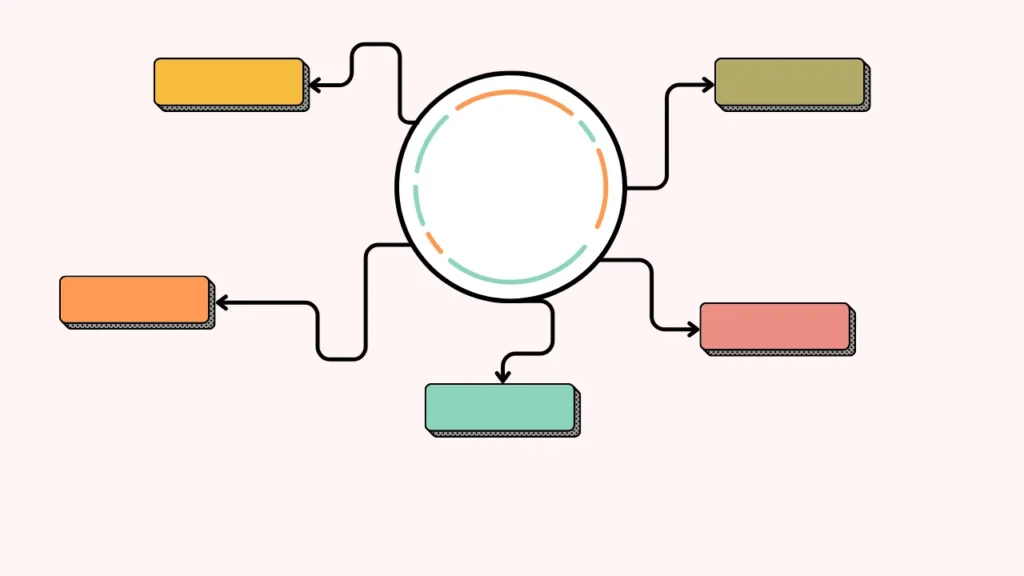
AI knowledge bases are vast repositories of data composed of numerous kinds of content. With the use of this information, organizations can better support their customers, take better decisions, and run their operations effectively by managing, accessing, and using a variety of data formats.
Structured
Knowledge content that has been methodically produced and categorized is referred to as structured knowledge content. This content consists of articles, guides, FAQs, and manuals. In a strategic hierarchy, the pertinent or helpful information is placed at the top.
Knowledge base searches can be improved by organizing knowledge content into standardized formats, using consistent terminology, and optimizing keywords or categories.
Unstructured
Information without a set format or structure is referred to as unstructured knowledge material. Content of this kind comprises:
- Client correspondence
- transcripts of conversations
- Interactions on social media
- Forum conversations
- Multimedia data, such as images or audio recordings
Because unstructured content comes in numerous forms and without a set framework, it can be difficult to manage and evaluate. AI-powered systems, on the other hand, make unstructured data useful and accessible inside the knowledge base by using NLP and ML algorithms to extract insights and meaning from it.
Automated
Information created or vetted automatically by AI algorithms is referred to as automated knowledge content. This content is constantly being developed, updated, and improved upon in response to user comments, data analysis, and interactions.
AI systems may, for example, automatically produce proposed answers to frequently asked customer questions, condense extensive document material, or provide suggestions for enhancing current content based on metrics related to user interaction.
Content generation becomes easier, relevance cannot be compromised, and the accuracy and efficiency of the knowledge base are improved with the help of automated content.
Best AI Knowledge Base Software

The top AI knowledge base platforms for 2024 are shown here.
Slite

Slite is an AI knowledge base repository that helps distant teams collaborate and share information. Its search function compares query to information in the knowledge base and uses AI and NLP to comprehend intent.
When users see a knowledge gap or missing piece of information, they can ask internal specialists questions using Slite’s collaboration tool. With the aid of Slite’s AI helper, staff members can create content by modifying tone, translating text into fifteen languages, and summarizing papers.
Analytics tools offer numbers regarding the documents people read and search for frequently, along with insights into content interaction.
Korra

Customers and support staff benefit from Korra’s AI knowledge base, which provides pertinent information as needed. The program has a sophisticated search engine that delivers correct information and recommendations to customers and support agents on demand using machine learning techniques and natural language processing.
Korra’s AI-powered knowledge management system can automatically identify and combine data from disparate systems and formats. It brings fragmented content from several sources together, deciphers user intent, and populates the knowledge base with the relevant tags and procedures.
In order to assist in the updating of knowledge base data, Korra can also analyze client interactions.
Tettra
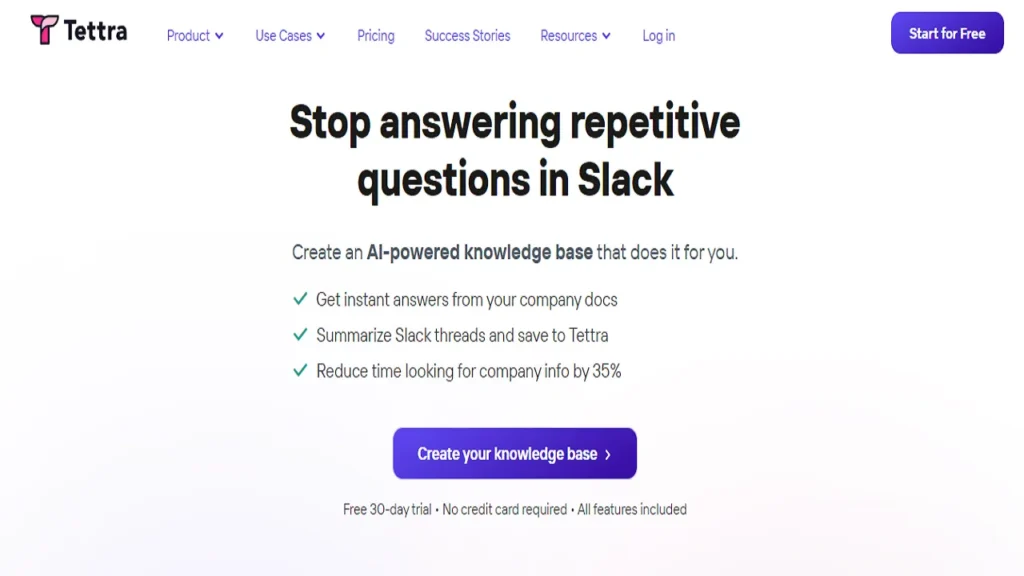
Tettra is a knowledge management solution driven by AI that helps firms collaborate and document processes. Its AI assistant may respond to consumer inquiries, and it assists teams in creating content for an internal knowledge base and organizing company information.
If the bot cannot discover an answer inside the knowledge base, the bot can redirect the request to a human agent. Teams can efficiently find, access, share, and work together on knowledge base content with Tettra’s AI-powered search engine and tagging features.
Tettra also has a knowledge management dashboard that maintains data accuracy, assists in identifying knowledge gaps, and provides edit suggestions. The dashboard can compile a list of validated content, stale pages, and publicly accessible content for users outside of an organization with the aid of artificial intelligence.
Guru

Guru provides employees with a single platform to ask questions, access and share information, and receive personalized recommendations through its AI knowledge base. The system use machine learning methods to enhance search results and check and authenticate content found in the knowledge base.
The Guru browser extension allows for real-time access to verified information within applications and connects with an organization’s current tools. Guru has a tool termed AI Suggest Expert for content management, which suggests content creation for particular themes by internal subject matter experts.
Generative AI is used to assist staff members in content creation, editing, and summarization.
Starmind
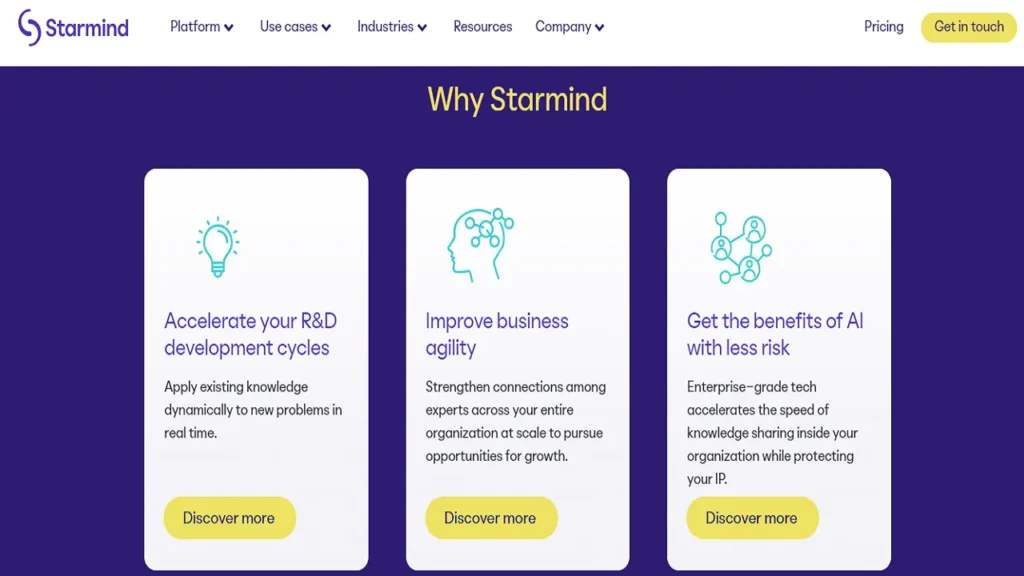
Starmind’s AI knowledge base software uses machine learning techniques to assist in knowledge sharing among employees. Based on employee search queries, the technology gathers information from subject matter experts via an internal directory accessible to the entire enterprise.
When an employee asks a question that does not have an answer in the knowledge base or needs further information, Starmind links them with an internal expert. The platform saves the answer to the query in the knowledge base for later use.
Starmind sources information using generative AI and stores it in an easily accessible hub to maintain the knowledge base current.
Capacity
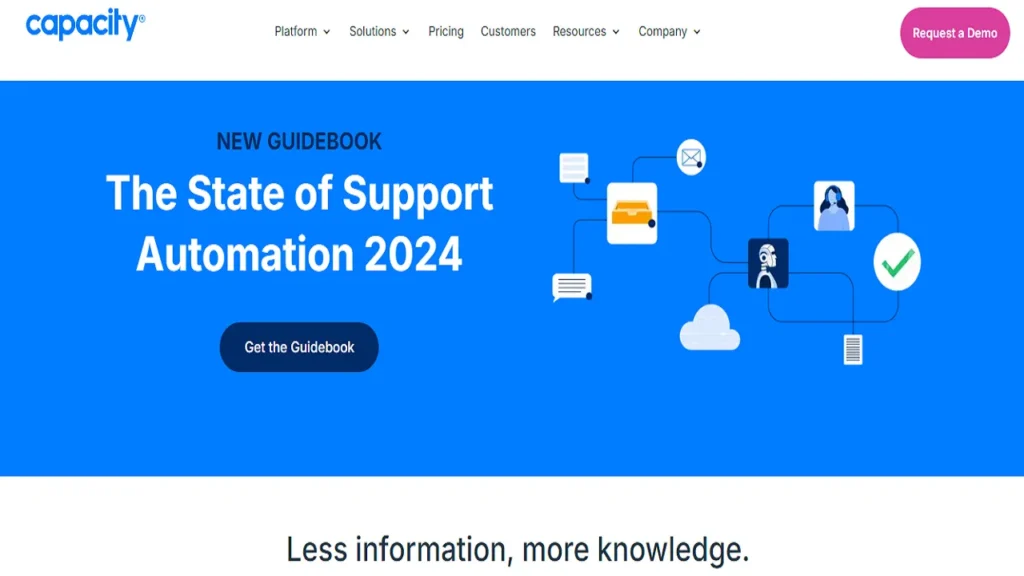
Capacity provides an AI knowledge base that stores, organizes, and retrieves data intelligently. In order to organize information across systems while keeping it accessible to employees in one location, it offers a consolidated repository.
It has search capabilities that retrieve particular information for staff members using an automated query generator. Businesses can effectively store and manage their knowledge using Capacity’s AI knowledge base software.
Information can be shared via a drag-and-drop function, and users can organize it with ease using dialogues and folders. Access can be controlled according to a variety of factors, including employee, department, role, and geolocation.
Zendesk

Zendesk offers flexible AI knowledge base software that has a user-friendly interface, robust self-service choices, and generative AI capabilities. It is a flexible tool that improves employee and customer satisfaction and sets up quickly for a quick return on investment.
Content Cues is an AI-powered product from Zendesk that uses machine learning to enhance your knowledge base. For instance, by looking through incoming tickets and identifying patterns in frequently asked questions and keywords, the program might identify support topics.
It also maintains your material current and highlights the best and worst-performing help center items. Zendesk use generative AI to create help center content quickly and with less effort. Users can click to change the tone of articles or expand material from a few lines or bullet points to entire paragraphs.
Zendesk has low-maintenance AI chatbots that promote engagement and deploy in a matter of seconds. With the help of knowledge base data, they can produce precise answers and offer conversational, natural AI support.
You may design a chatbot character to provide your bots a recognizable voice that embodies the essence of your company.
How to Build AI Knowledge Base?

Having seen some of the top AI-powered systems and knowing what to look for in a knowledge base, let’s talk about how to develop one. To build the best AI knowledge base for your company, follow these steps.
Establish Your Objectives and Parameters
Start by determining the precise goals and extent of your AI knowledge base. Specify the goal, the intended audience, and the anticipated results. Describe the main features, such as internal information sharing, customer care automation, and self-service for customers.
Subsequent decisions and implementations shall be guided by established objectives and scope.
Search Into and Select the Knowledge Base Program
Choose an AI knowledge base program that best fits your needs and goals by doing some research. Think about things such as cost-effectiveness, scalability, integration choices, ease of use, and AI capabilities. Use trial versions of software to try out various programs and determine which one is the best fit for your company.
Collect and Prepare the Data
Gather information from sources that are relevant to your knowledge base, such as FAQs, customer encounters, and papers that are already in existence. To prepare the data for AI analysis, preprocess it by cleaning, arranging, and structuring it. Your data should be accurate and of high quality to increase the efficacy of your AI model.
Choose the Appropriate Structure
Create a knowledge base that has the best possible framework for content organization. Depending on the type of data you have and the preferences of your consumers, you can choose between organized and unstructured formats. Create a classification scheme, tagging scheme, or taxonomy to help with effective information retrieval.
Produce and Maintain Superior Content
Add accurate, pertinent, and high-quality content to your knowledge base. Put your energy into producing helpful material, such as tutorials, FAQs, articles, and guides that answer commonly asked questions and meet the needs of users. For complete correctness and relevancy, take steps to maintain and update content.
Put Your AI Model into Practice
Integrate your AI models such as machine learning and natural language processing into your knowledge base software. Pre-trained systems eliminate the need for time-consuming and expensive manual training. The algorithms can be adjusted to increase the precision and applicability of the responses and suggestions.
Evaluate and Improve Your Artificial Intelligence Systems
Verify that your AI knowledge base is operating as you intended by assessing its performance. Examine the usefulness, accuracy, and reactivity in a variety of settings and with clients. To find areas for development and to improve the AI systems, gather user feedback.
Include AI-Driven Technologies
Expand the functionality and capacities of your systems by integrating AI-powered solutions. Chatbots and generative AI technologies are examples of integrations that can improve your knowledge base. For optimal performance, verify that there is a smooth connection with current systems and procedures.
Create an Intuitive User Interface
Provide an intuitive user interface that facilitates to browse to obtain information from your knowledge base. To increase engagement and usefulness, devote priority to intuitive design, optimal search functions, and individualized user experiences.
Track Results and Provide Input For Ongoing Development
Use analytics and metrics to keep an eye on your AI knowledge base’s performance over time. This lets you monitor user interactions, how material is used, and the quality of the AI model each of which might point out areas for development. To improve your knowledge base, you can also ask stakeholders and internal users for input.
Conclusion: AI Knowledge Base
The capabilities of an AI knowledge base can do wonders for your organization. By recognizing and optimizing content development, enabling intelligent self-service, and expediting training, artificial intelligence can lower expenses while improving the consumer and employee experience.
AI knowledge bases are revolutionizing customer support teams as companies aim to achieve new heights with their CX initiatives. Purchasing an AI knowledge base can assist you in streamlining processes and producing content while adjusting to constantly changing client needs.
FAQs: AI Knowledge Base
What is an AI Knowledge Base?
An AI Knowledge Base is a centralized repository that utilizes artificial intelligence to manage, store, and retrieve information efficiently. This system integrates machine learning algorithms and natural language processing to enhance the usability of knowledge management.
It allows organizations to provide relevant information to their users, improving the overall customer experience. An AI-powered knowledge base can be tailored to fit specific needs, so it is a valuable tool for support teams and customer support operations.
How does an AI Knowledge Base improve customer support?
An AI Knowledge Base enhances customer support by enabling support agents to quickly access up-to-date information. This system allows for the automation of responses to customer queries through chatbots and provides relevant articles or content from the knowledge repository.
With the use of AI, support teams can identify knowledge gaps and address them, resulting in faster response times and higher satisfaction rates from customers.
What are the benefits of using an AI-powered knowledge base software?
The benefits of using AI-powered knowledge base software include improved efficiency in retrieving information, reduced workload for support agents, and enhanced customer interactions.
These systems can learn from previous customer queries and adapt their responses over time, so the knowledge base is effective at delivering answers that users need. They can provide insights into knowledge base’s performance and user engagement, allowing organizations to optimize their knowledge management strategies.
What types of content can be stored in an AI Knowledge Base?
An AI Knowledge Base can store a wide range of content, including knowledge base articles, user manuals, troubleshooting guides, FAQs, and other relevant documentation. This repository of information allows organizations to centralize their internal knowledge.


